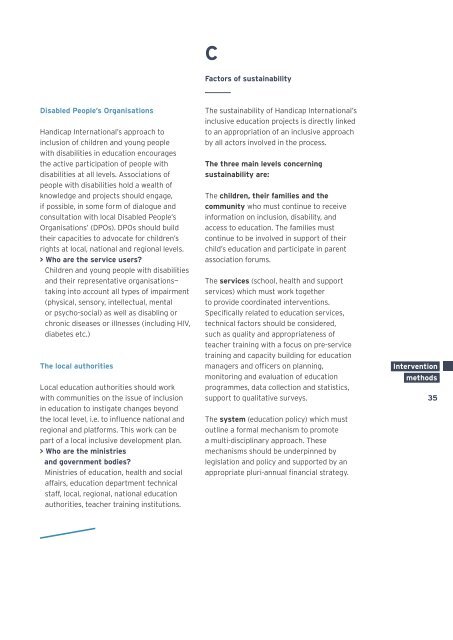Inclusive Education : Policy paper - Hiproweb.org
Inclusive Education : Policy paper - Hiproweb.org
Inclusive Education : Policy paper - Hiproweb.org
Create successful ePaper yourself
Turn your PDF publications into a flip-book with our unique Google optimized e-Paper software.
C<br />
Factors of sustainability<br />
Disabled People’s Organisations<br />
Handicap International’s approach to<br />
inclusion of children and young people<br />
with disabilities in education encourages<br />
the active participation of people with<br />
disabilities at all levels. Associations of<br />
people with disabilities hold a wealth of<br />
knowledge and projects should engage,<br />
if possible, in some form of dialogue and<br />
consultation with local Disabled People’s<br />
Organisations’ (DPOs). DPOs should build<br />
their capacities to advocate for children’s<br />
rights at local, national and regional levels.<br />
> Who are the service users?<br />
Children and young people with disabilities<br />
and their representative <strong>org</strong>anisations—<br />
taking into account all types of impairment<br />
(physical, sensory, intellectual, mental<br />
or psycho-social) as well as disabling or<br />
chronic diseases or illnesses (including HIV,<br />
diabetes etc.)<br />
The local authorities<br />
Local education authorities should work<br />
with communities on the issue of inclusion<br />
in education to instigate changes beyond<br />
the local level, i.e. to influence national and<br />
regional and platforms. This work can be<br />
part of a local inclusive development plan.<br />
> Who are the ministries<br />
and government bodies?<br />
Ministries of education, health and social<br />
affairs, education department technical<br />
staff, local, regional, national education<br />
authorities, teacher training institutions.<br />
The sustainability of Handicap International’s<br />
inclusive education projects is directly linked<br />
to an appropriation of an inclusive approach<br />
by all actors involved in the process.<br />
The three main levels concerning<br />
sustainability are:<br />
The children, their families and the<br />
community who must continue to receive<br />
information on inclusion, disability, and<br />
access to education. The families must<br />
continue to be involved in support of their<br />
child’s education and participate in parent<br />
association forums.<br />
The services (school, health and support<br />
services) which must work together<br />
to provide coordinated interventions.<br />
Specifically related to education services,<br />
technical factors should be considered,<br />
such as quality and appropriateness of<br />
teacher training with a focus on pre-service<br />
training and capacity building for education<br />
managers and officers on planning,<br />
monitoring and evaluation of education<br />
programmes, data collection and statistics,<br />
support to qualitative surveys.<br />
The system (education policy) which must<br />
outline a formal mechanism to promote<br />
a multi-disciplinary approach. These<br />
mechanisms should be underpinned by<br />
legislation and policy and supported by an<br />
appropriate pluri-annual financial strategy.<br />
Intervention.<br />
methods .<br />
35

















